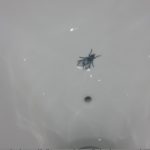
Aim for the Fly A.Currell/ Flickr
Nudge theory was originally used to make small but consistent changes in user behaviour over a period of time to create better personal and community outcomes. In the last post we mentioned the case of organ donation but perhaps the most famous example is the ‘urinal fly’ introduced at the Amsterdam airport – a fly painted on the men’s urinal, encouraging better aim (or more attention!) which had the effect of reducing spillage by 80% and cleaning costs by 8%. It was results like these that led to governments around the world setting up ‘nudge units’ to see what other applications were possible. But the focus was on consumer behaviour. They looked to see how others could be nudged, but what about nudging ourselves – the decision makers?
Can we be nudged to make better decisions? Joe Arvai, Professor of Sustainable Enterprise at the University of Michigan, says “ governments have made important strides when it comes to using behavioral science to nudge their constituents into better choices. Yet, the same governments have done little to improve their own decision-making processes. Consider big missteps like the Flint water crisis. How could officials in Michigan decide to place an essential service – safe water – and almost 100,000 people at risk in order to save US$100 per day for three months? No defensible decision-making process should have allowed this call to be made”. (my emphasis) His article in The Conversation is worth reading.
User decisions, such as choosing a default option, or aiming at a fly, are pretty simple. Infrastructure decisions, by contrast, are not. Joe Arvai refers to nudges as as ‘passive decision support’ because they don’t require a lot of effort on the part of the decision maker. “They are about exploiting – not correcting – the judgmental biases that people bring with them to all manner of decisions, large and small”.
Which lead us to ask: What cognitive biases affect our ability to make sound infrastructure decisions? And how can we use behavioural economics (of which nudge theory is but a part) to improve our choices? This is what we will look at in the next few posts.

Recent Comments